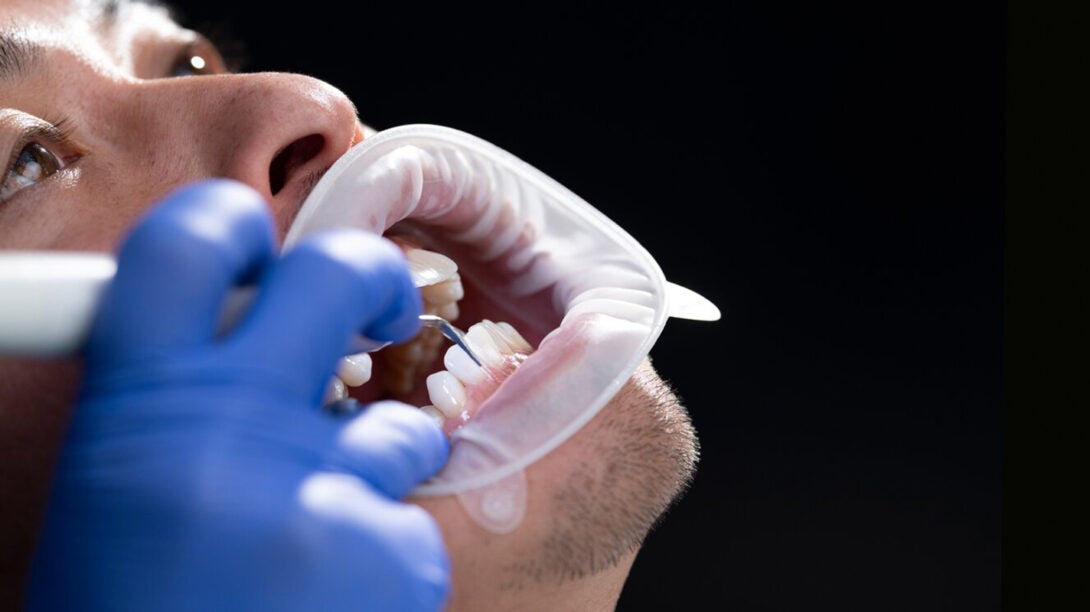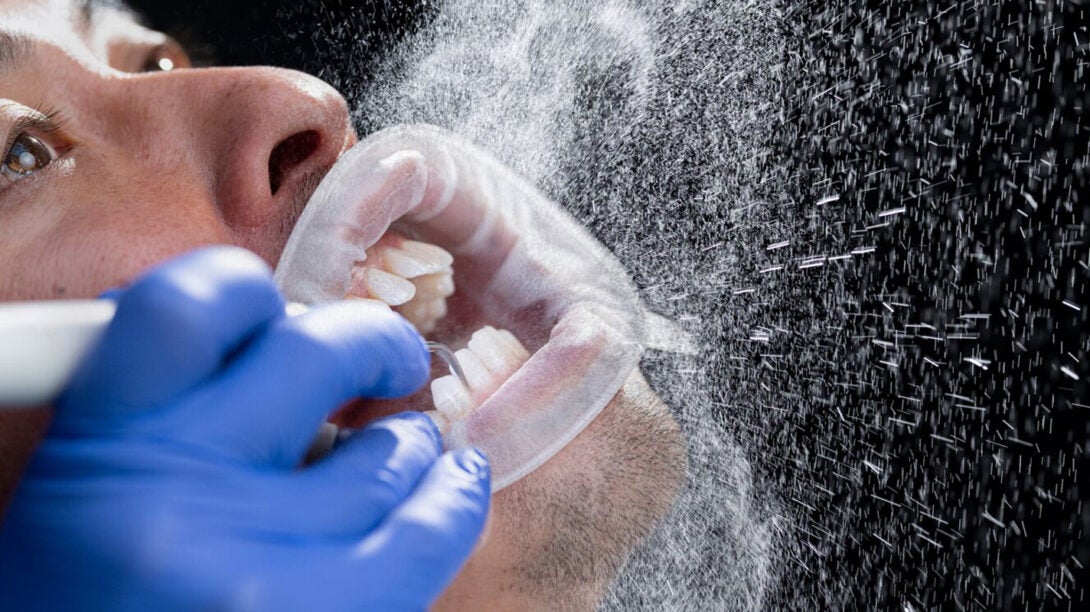UIC engineers’ invention improves dental safety
1

UIC Distinguished Professor Alexander Yarin and a team of researchers at UIC invented a product that revolutionized the dental industry and made it safer.
Dentistry was one of many fields impacted during the global COVID-19 pandemic. Dentists had to navigate how to treat their patients while maintaining safe working environments for everyone in their offices.
Dentists frequently use ultrasonic scaling tools known as Cavitrons, which use vibrations and water to clean teeth. The tool produces a sound wave that creates vibrations in its tip and also releases water adjacent to the tooth to create cavitating bubbles, which loosen plaque and tartar from teeth. The water flow simultaneously washes away the debris while cooling the Cavitron.
While the device can remove up to 50% more biofilm than hand scaling and is much faster than the latter, it also aerosolizes water and saliva droplets into the air. The aerosolized droplets carry bacteria and viruses and transmit diseases – including COVID-19 – to other patients and health providers. In addition, it was proven that droplets smaller than approximately 20 micrometers evaporate faster than they settle, and thus, pathogens of approximately 100 nanometers in size become fully airborne.
1

During the lockdown, the UIC College of Dentistry turned to UIC’s College of Engineering to help improve the ventilation and catch some droplets created by the Cavitrons and dental drills.
“I immediately propose another idea to change a little bit of the irrigation fluid from water to any dilute FDA-approved polymer solution, which will eliminate droplets completely,” he said. “Such a solution could be pumped through the dental chair as easily as water to have a low shear viscosity but should develop dramatically high elongational viscosity of viscoelastic origin in stretching, which prevents detachment of droplet tails from the main body of the irrigation fluid.”
While many laboratories were closed during the pandemic, Yarin’s Multiscale Mechanics and Nanotechnology Laboratory was allowed to open up to work on this COVID-related research. The team conducted the research, and within a month, they had a proof of concept.
“The UIC College of Dentistry, with the participation of their researcher Dr. Lyndon Cooper, let us prove the same using a real dental chair and a dental mannequin. In a month, UIC filed a provisional patent related to this invention, and it was immediately licensed to a company called Ivoclar in Liechtenstein, which is a leading dental supplier all over the world,” Yarin said.
After three years of developing the product at the company in collaboration with Yarin, the final product has been released in the U.S. and Europe and is available to dental professionals as VivaDent Aerosol Reduction Gel. The estimated market value could reach $1 billion annually.
The water-soluble gel can be mixed in the bottle of a dental chair, which takes about one to three minutes, and a modified irrigation fluid is pumped into the workflow of ultrasonic scalers and dental drills without the need for additional instruments. It practically eliminates droplets from being released around the room.
“The point is not to change the fluid so that it will be difficult to pump. My changes allow the fluids to pump exactly like water. However, they will behave totally different at the Cavitron scaler tip or a dental drill tip,” he said. “Droplets are trying to detach, but they cannot. Instead, long filaments are formed, and they are pulled back to the dental device because huge elastic forces develop in these tails, which prevents the formation of droplets.”
The prevention of droplets creates a safer space for dentists and patients. With VivaDent, water droplets are prevented from spreading around and creating airborne viruses and bacteria, creating potential cross-contamination.
“If the airborne viruses are on the scale of 100 nanometers – like COVID-19 – there is practically no mask to stop that,” Yarin said. “If you have a couple of patients sitting in different rooms or waiting rooms, the droplets spread all around and all of them will breathe it in.”
In addition to preventing the spread of viruses, Ivoclar discovered that the new irrigation fluid provided a more pleasant experience for dentists and patients. The company sent the product to European dentists to use with patients and document their responses.
Dentists reported eliminating aerosols provided better visibility of the teeth, and the dental mirror remained mostly unaffected during cleanings.
Patients like it a lot,” Yarin said. “From my own experience, I look forward to not having my glasses get wet or a water running down my neck onto my shirt.”